Superfoods for Diet for Dogs with Cancer For Quick Recovery

Cancer is fatal in dogs and it is increasing day by day. Diet for dogs with cancer is very crucial in situations when a dog owner is struggling with this deadly disease.
Once you learn about the disease of your pet you are always scared and will try all means to find a cure and relieve your pet.
Diet has a much greater role in helping your dog than medications do. A balanced and well-planned can diet can positively transform their health and thus improve a lot on the lives of these little souls.
Let us help you navigate how you can feed dogs that have cancer.
Importance of Diet in Cancer Management
Right nutrition plays a vital role in managing cancer in dogs. A good diet can maintain their weight, immune system, and overall health.
A good and balanced diet can slow down the effects of cancer. Several nutrients can stop the growth of cancer cells. A good diet can boost the immune system, providing the power to fight off the disease.
Feeding your dog with essential nutrients can lead to a better energy boost, improved strength, and a healthy life. It can also help alter symptoms and side effects of cancer treatments.
Foods to Include
Some foods are beneficial for dogs with cancer. Consumption of these can make a big difference.
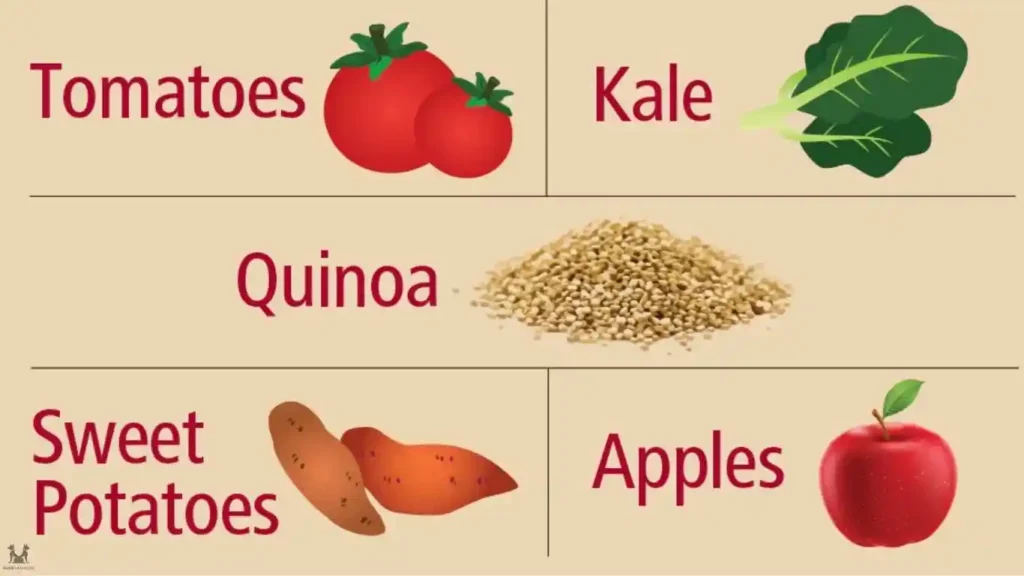
Cancer-Fighting Foods
Blueberries, broccoli, spinach, and turmeric have nutrients that can help fight cancer. They contain antioxidants and anti-inflammatory compounds.
Building a Balanced Diet
Consuming proteins, healthy fats, and carbs with cancer-fighting foods makes a diet that reinforces your dog’s health and fights the illness.
Foods to Avoid
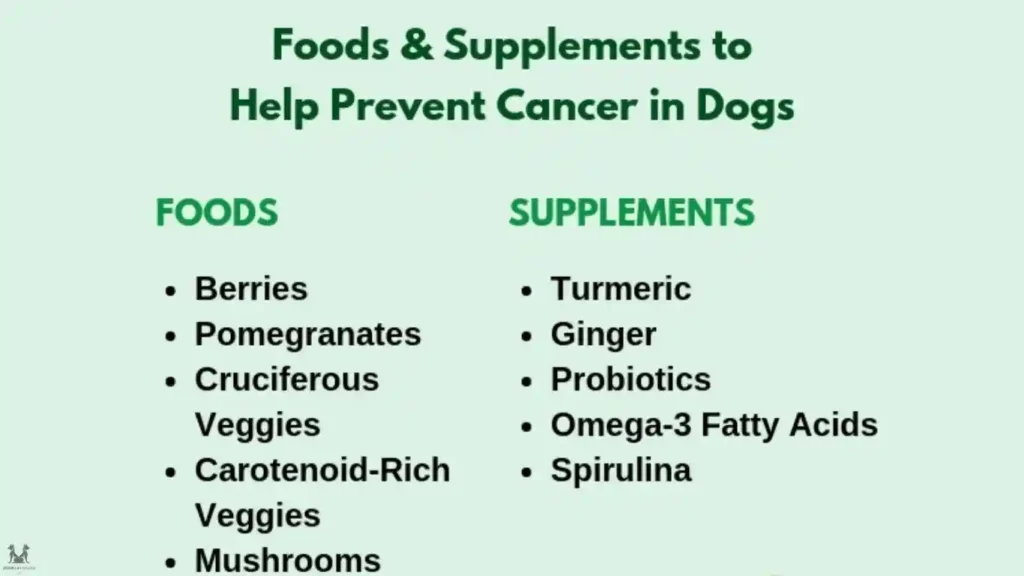
It is important to know what to include and what to avoid. Some foods can be harmful to dogs with cancer. Avoid foods with high sugar, artificial preservatives, and fillers. They can cause inflammation and cancer growth.
Avoid commercially processed dog food because they contain ingredients like BHA, BHT, and ethoxyquin that can be harmful. Always read labels and choose natural ingredients.
Key Nutritional Components
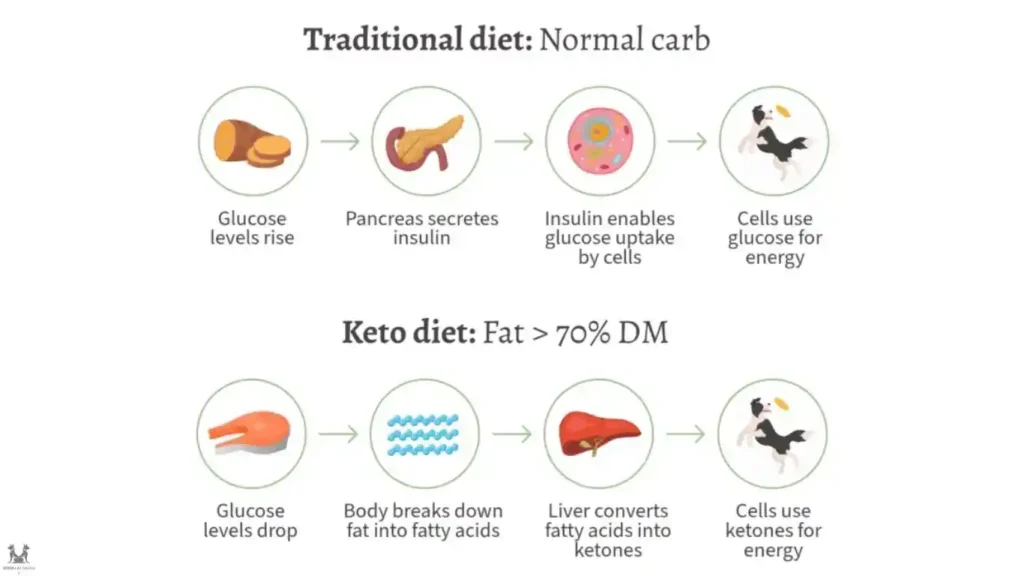
Focus on the right nutritional components is essential while crafting a diet for dogs with cancer.
Proteins, fats, carbohydrates, vitamins, and minerals all have crucial roles in supporting different bodily functions and contribute to the overall health of your dog.
Balancing a diet for dogs with cancer with essential nutrients in a way that helps your dog’s growth and health without promoting cancer growth. It is only possible when you understand the specific needs of a dog with cancer.
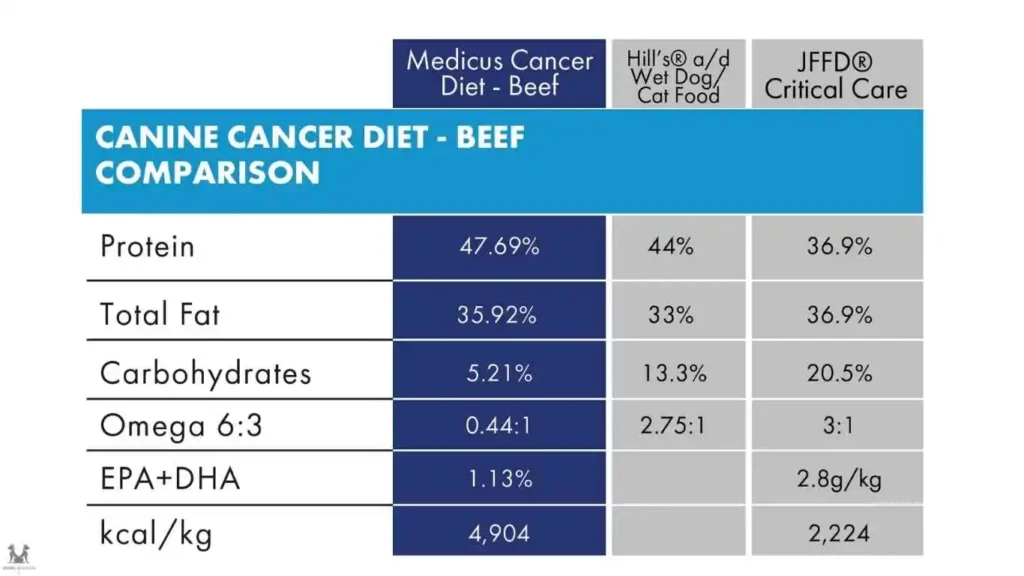
Protein Needs for Dogs with Cancer
Protein is very important for dogs because it helps maintain muscle mass and supports the immune system.
High-quality proteins are necessary to balance your dog’s diet and keep it strong because cancer and its treatments can lead to muscle wasting.
Always consult with your vet to feed according to the dog’s specific condition. Chicken, turkey, and fish meat are excellent sources of protein. Eggs and cottage cheese are also good options.
Fats and Omega-3 Fatty Acids
Fats are a crucial part of a cancer-fighting diet, especially omega-3 fatty acids.
They are essential for maintaining body weight and energy levels as they provide energy and help with the absorption of fat-soluble vitamins.
Omega-3 fatty acids have anti-inflammatory properties, found in fish oil and flaxseed, They slow down cancer growth and improve your dog’s overall health.
Carbohydrates For Dogs
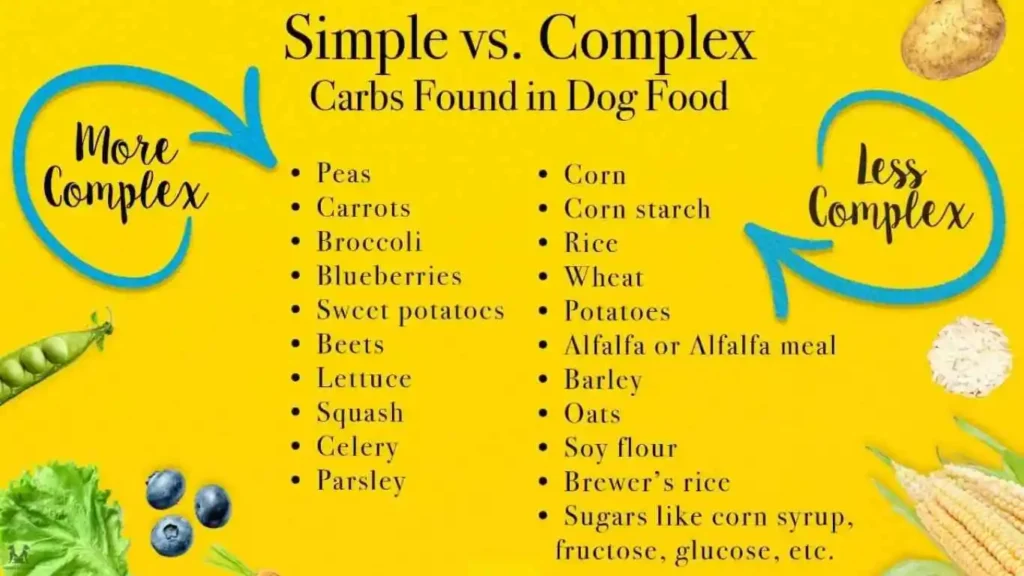
Carbohydrates usually get a bad rap in cancer diets. However, they have advantages as well. Cancer cells use glucose for energy and some types of carbs can contribute to cancer growth. However, not all carbs have bad properties.
Use complex carbohydrates like sweet potatoes, quinoa, and brown rice. These provide necessary fiber and nutrients without increasing blood sugar levels.
Vitamins and Minerals
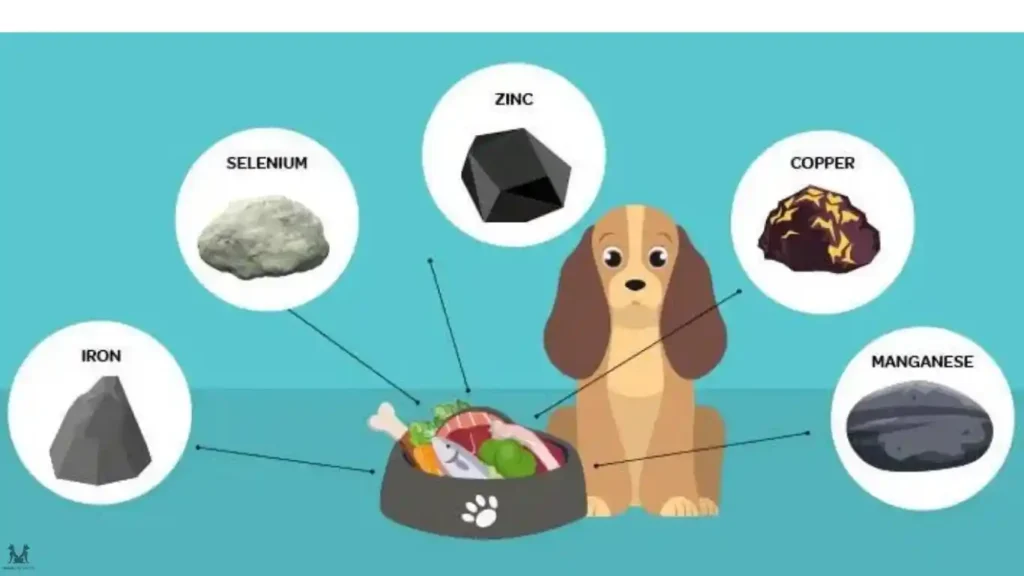
Vitamins and minerals are important for your dog’s immune function and they should be in the diet for dogs with cancer.
Vitamins such as A, C, and E are antioxidants that support the immune system and help protect cells from damage. They have an overall positive impact on health.
Vital immune-supporting minerals are zinc and selenium. They can also reduce inflammation and support overall health.
Hydration is Key
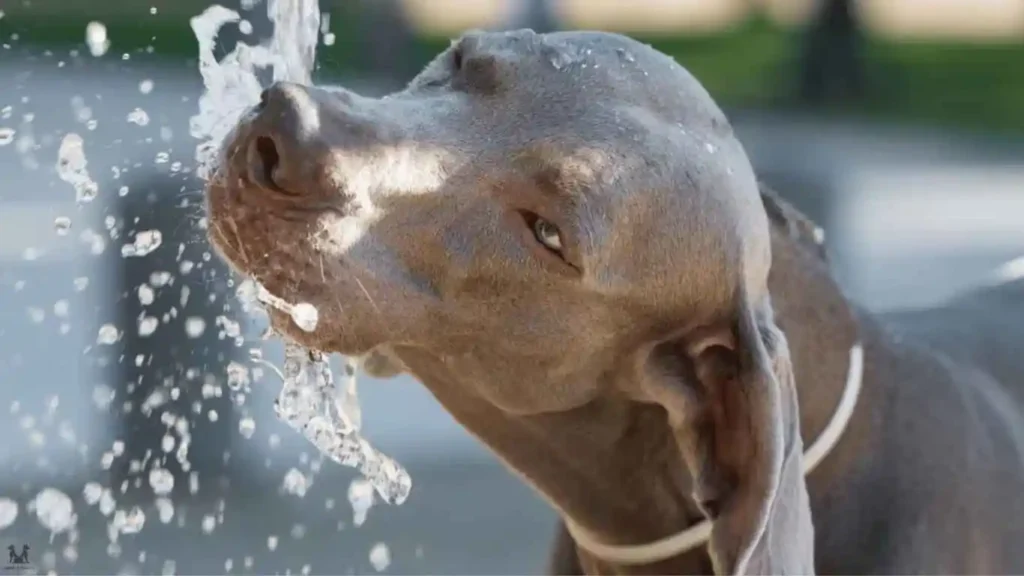
Staying hydrated helps with digestion, nutrient absorption, and overall body function. It is crucial for all dogs and animals.
Water regulates body temperature, flushes out toxins, and keeps tissues moist. Dehydration can worsen symptoms and affect the effectiveness of treatments.
Provide your dog with constant fresh water. Add moisture-rich foods to their diet, like broth or wet food.
Homemade vs. Commercial Diets
Both homemade and commercial diets have their pros and cons. It is difficult to choose one.
You to control the ingredients and ensure quality at home. However, they require time, effort, and knowledge about food to balance correctly.
Some commercial diets are specifically created for dogs with cancer and other diseases. Look for high-quality authorized brands that prioritize natural ingredients and proper nutrient balance.
Supplements Role in Diet for Dogs with Cancer
Supplements can provide extra support, and it can be a great addition to your dog’s diet.
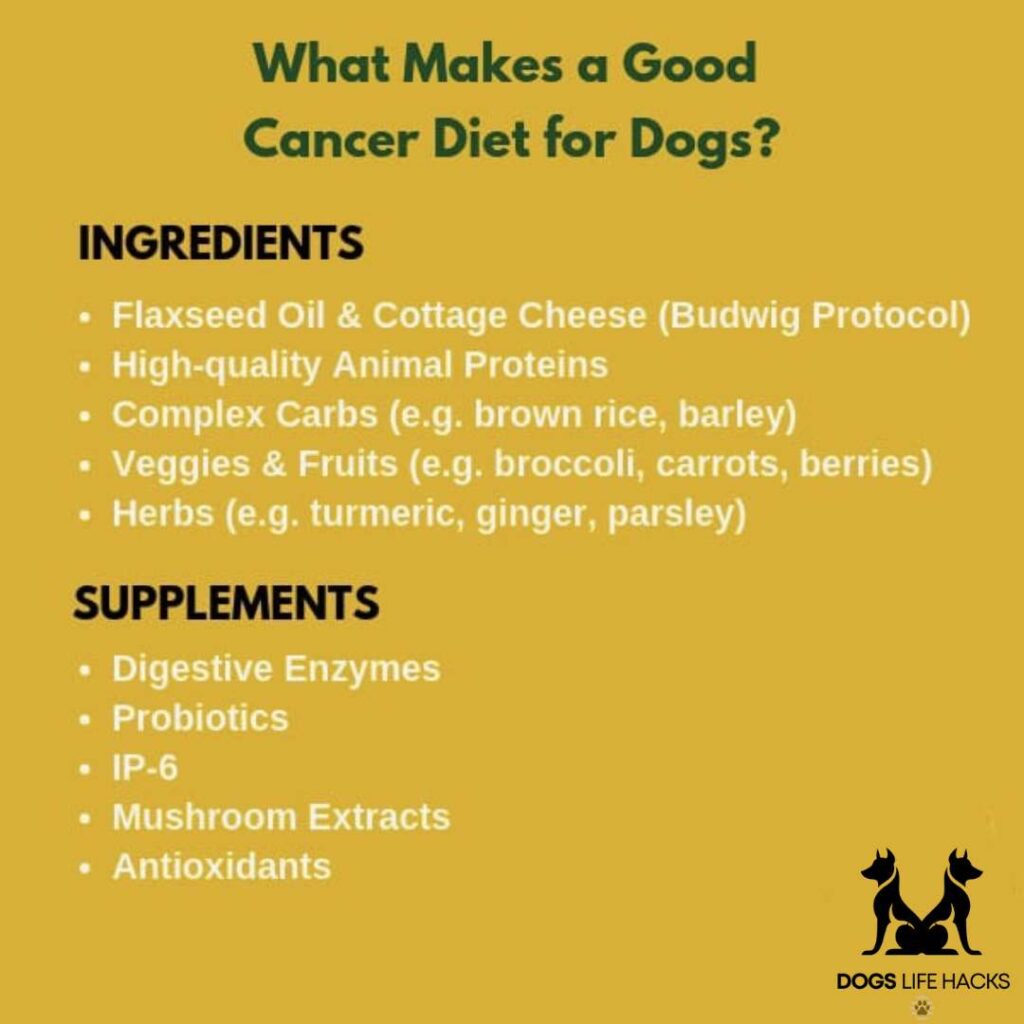
Supplements can help the immune system to perform better and reduce inflammation. Fish oil, probiotics, and turmeric can provide additional health benefits.
Before adding supplements to your dog’s diet, consult with your veterinarian. They can guide you on the correct types and dosages.
Understanding Cancer in Dogs
Cancer in dogs is a common disease. Understanding the basics can help you manage this difficult time more clearly and confidently.
Canine cancer alludes to harmful growths of tumors that can influence various pieces of a dog’s body. Like humans, tumors can upset ordinary body works and spread to different parts of the body.
Some common types include lymphoma, osteosarcoma (bone cancer), hemangiosarcoma (cancer of the blood vessels), mast cell tumors, and mammary gland tumors. Each type has unique challenges and requires specific diets.
Consulting with Your Veterinarian
Your vet is your best option for managing your dog’s diet during cancer treatment.
Veterinarians can provide professional advice based on their experience and your dog’s specific condition. They can give a balanced diet plan and monitor your dog’s progress.
Ask about the best healthy organic foods and supplements for your dog, about feeding time, how to balance nutrients, and any specific diet related to their type of cancer.
Summary of Diet for Dogs with Cancer
Feeding a dog with cancer involves a precise diet plan and consideration. By adding the right nutrients, avoiding harmful foods, and consulting with your vet, you can further develop your canine’s satisfaction and back up their battle against disease.
FAQs About Diet for Dogs with Cancer
What foods are good for dogs with cancer?
For dogs diagnosed with cancer or health concerns, a diet full of easy-to-digest fatty high-quality proteins and minerals, like chicken, turkey, pork, fish, and eggs.
Is milk good for dogs with cancer?
Avoid feeding raw diets to pets with cancer. Raw meat, eggs, and milk carry a high risk of bacteria like Salmonella, Listeria, E. coli, Campylobacter, and other potentially dangerous bacteria.
What is the best homemade food for dogs with cancer?
Cooked, defatted, low-sodium proteins like chicken, turkey, beef, lamb, and fish are great options to use as the basis of home-prepared meals.
Is yogurt good for dogs with cancer?
Yogurt can reduce the risk of diseases and cancer. Yogurt is full of probiotics, a type of live bacteria that can help your pet’s digestion and immunity.
Related Blogs
- Can Dogs Eat Goji Berries? Benefits, Risks & Best Food Tips
- Best Way to Use Chicken Meal in Dog Food | Types & Benefits
- Ear Mites in Dogs | Guide to Symptoms, Diagnosis & Best Cure
- Are Chicken Feet Good for Dogs? Benefits and Safety Tips
- Best Fish Oil Dosage Calculator for Dogs: Dog’s Health Guide
- Causes of Dog Shaking Head | Symptoms, and Treatment Guide
- World’s First Airline for Dogs Fly First Class with BARK Air
- Why Dog Losing Weight But Eating – Find Shocking Reason!
- My Dog Has Diarrhea But Is Acting Fine – What Should I Do?
- Can Dogs Get Cavities? Find out Shocking Truth & Treatment
- Can Dogs Eat Turmeric? Benefits, Risks, and Best Guidelines
- Why is Dog Pooping Blood? Tips by Best Experts & What to Do!
- Prevent Hematoma Dogs Ear Causes, Symptoms & Quick Relief
- Irresistible No Bake Dog Treats Your Furry Friend Will Love!
- Curious Can Dogs Have Jicama? Secrets You Need to Know!
- Can Dogs Drink Alkaline Water? Uncover Shocking Cons & Pros
- Can Dogs Eat Manuka Honey? Perk or Danger? Surprising Facts
- Healthy Turkey Dog Food Nutritious & Delicious Meal for Pup

2 Comments